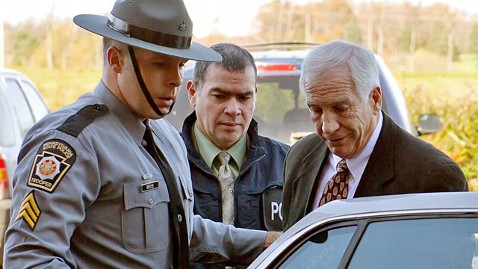‘Nice Guy Molesters’ Believe They’re ‘Child Lovers’

“I enjoy young people,” Jerry Sandusky told NBC’s Bob Costas Monday. “I love being around them.”
That was Sandusky’s explanation after being accused of 40 counts of child molestation charges. He enjoys kids. He started the popular and successful Second Mile charity; he says he even felt like a kid himself sometimes.
But that ‘nice guy’ defense is a classic tactic of a child sexual predator, said Ken Lanning, a former FBI special agent for 30 years and now a consultant in the area of crimes against children. This type of predator hones in on children who are particularly vulnerable, then gives them whatever it is they feel they’re missing. Poor? The predator will shower the child with gifts and money, Lanning said. No dad? The child molester looks to fill that void by acting as a fatherly figure.
“They call themselves child lovers,” said Lanning. ”They nurture these kids, so when someone asks, ‘Did you molest this child?’ they say, ‘I would never molest or hurt a child.’”
“In their mind, it’s not molesting, it’s love,” he said.
The defense and justification is one that has been seen before in high-profile cases of alleged child molestation. When Michael Jackson was accused of such an act, he told ABC’s Diane Sawyer in a 1995 interview that he could “never harm a child or anyone. It’s not in my heart.”
Jackson and the accuser’s family and Jackson’s team came to a $20 million civil settlement.
A decade later, Jackson faced four more charges of child molesting, along with one charge of attempted child molesting and eight possible counts of providing alcohol to minors. He was found not guilty in 2005.
During the Jackson trial, Lanning recalled many of Jackson’s friends and family coming to his defense by saying, “He’s dedicated his life to children. He loves children. He’s like a child himself.”
While Lanning does not want to discourage or call into question all the good people who do work with children, especially underserved youths, he said many of Jackson’s defenses didn’t actually clear him.
“When people said he liked children more than adults and is always taking in troubled kids to his ranch, none of that means he’s not a child molester. I’m not saying he is, but that certainly doesn’t say he’s not. It fits with a consistent mold with many individuals who have this problem.”
For both Sandusky and Jackson, Lanning said, “nothing is unique about either situation when looking at child molestation charges.”
Child-lover molesters almost never use violence for sex, said Lanning. Instead, they groom and seduce and manipulate and use cooperation to get what they want out of the child.
“I can’t tell you how many cases where there are letters from the victim written to the accused, saying, ‘You’re the nicest person I ever met,’ or ‘You’ve been so good to me,’” said Lanning.
Many victims don’t tell anyone of the inappropriate behavior because they are considered “compliant child victims.”
“A child can’t legally consent to having sex, but some of them aren’t necessarily fighting him off,” said Lanning. “They’re developmentally immature, and later they feel ashamed and embarrassed that they cooperated in their victimization.”
At any one time, these types of child molesters have four different areas of focus going on at once.
“They operate in a pipeline,” said Lanning. “They always have their eye out for new victims and new kids to go in the pipeline; then they go into full seduction mode. They’re grooming the kids, and usually the parents, too, by showering the kids with gifts and attention. Then at some point, they’re having full sexual activity with the child; then later, maybe a year or two after this goes on, the kid gets too old and the predator is not interested anymore. He’ s trying to move him out– pushing him out the other end of the pipeline.”
The kids then often realize that the predator did not actually care about him. The predator used him and no longer has an interest in him sexually.
“That’s when victims often come forward,” said Lanning.
If parents feel suspicious, Anna Salter, a Wisconsin-based psychologist who has worked with sex offenders and victims for 30 years, said they should not feel like they need hard proof to remove a child from the situation.
“If you’re wrong, you’re wrong,” said Salter. “If you’re right, you’ve really saved the kid from severe trauma. You must act conservatively when it comes to the health and safety of children.”
“I often tell parents, if any adult wants to be around your kids more than you do, beware,” said Lanning. “And beware of anything that seems to be too good to be true.”
“Everyone is angry at Penn State, but it could happen again and we all need to understand that organizations are living organisms—the first priority is survival,” said Salter. “People underestimate the pull to save an organization, and we have to send a powerful message that, yes, there is the desire to protect the organization, but you have an allegiance to the larger society and to children not to yield to that pull.”